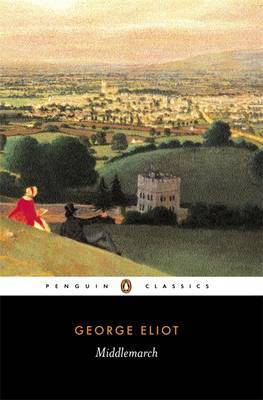Review: 'Middlemarch' by George Eliot
 Middlemarch is a book I read quite a long time ago and yet never wrote a review for. It is said to be George Eliot's best work and when I read it I was blown away by the detail and delicacy with which she wrote.
Middlemarch is a book I read quite a long time ago and yet never wrote a review for. It is said to be George Eliot's best work and when I read it I was blown away by the detail and delicacy with which she wrote.'People are almost always better than their neighbours think they are'
George Eliot's most ambitious novel is a masterly evocation of diverse lives and changing fortunes in a provincial community. Peopling its landscape are Dorothea Brooke, a young idealist whose search for intellectual fulfilment leads her into a disastrous marriage to the pedantic scholar Casaubon; the charming but tactless Dr Lydgate, whose pioneering medical methods, combined with an imprudent marriage to the spendthrift beauty Rosamond, threaten to undermine his career; and the religious hypocrite Bulstode, hiding scandalous crimes from his past. As their stories entwine, George Eliot creates a richly nuanced and moving drama, hailed by Virginia Woolf as 'one of the few English novels written for grown-up people'.Before getting into the book, a quick word on George Eliot herself, who was a fascinating woman. George Eliot was a pen name for Mary Anne Evans, who hoped that by assuming a male name her work would be taken more seriously. It's no surprise she did so, since Mrs. Radcliffe's novels were all the rage in her time. Next to being a novelist she was also a journalist and translator. She wrote in the same time as Jane Austen but had a completely different style, which shows how different an age can work on the minds of people. Another reason for her pen name was the desire to keep her private life as private as possible. Her 20-year relationship with the married philosopher George Henry Lewes was something incredibly scandalous, despite him having an open marriage with his wife. In 1880 Eliot continued to cause controversy by marrying a man 20 years her junior. When she died, however, she was buried next to George Henry Lewes. As you can see, she was a spectacular woman. Now, onto Middlemarch itself.
There is not one other book I can think of that excels in bringing the thoughts and feelings of a small English town to life the way that Eliot does in Middlemarch. Where Jane Austen chooses her protagonist and shows the reader the world through her, Eliot fluently moves between characters, professions and classes in order to bring her landscape to life. Her writing is at times deeply psychological which can be hard to get through, but at the end of the novel you walk away understanding humans in a whole new way. Not to say that the plethora of characters doesn't become confusing and that at times you will despair at the plot. But where's the fun if there's no challenge?
What I really enjoyed was the way Eliot made the reader reconsider characters. Initially, Dorothea seems to be too holy, too pious and too stubborn. The reader knows that her marriage to Causabon will be a disaster and yet you find yourself rooting for her. Personally, I loved reading about a female character desperate for knowledge and self-improvement. Looking up to those more knowledgeable than you and idolizing them comes naturally to Dorothea and seeing the shift in how she and Causabon consider each other is really interesting.
Throughout the novel there is a pattern, where people realize that how they thought someone was and how they actually are are two opposite thing. It is fascinating to read and since Eliot gives you access to everyone's mind the reader finds themselves constantly switching loyalties and affections. It is especially the female characters who are developed and worked out, without them being placed on pedestals. Eliot clearly had an eye for how women operate in her society, which requires a lot of self-awareness. Nothing feels overdone or ridiculous and once you finish Middlemarch you might even find yourself wishing there was more.
I give this novel...

5 Universes!
Middlemarch is a marvel. It is both intricate and sweeping, talking about everyone while discussing only one. Although it is a commitment, it is definitely worth taking the time for. Because of its complexity I would recommend only reading it when you're ready for it, but then not giving up on it!



I haven't read that many classics... just a few of them.. jane austen's sense and sensibility was one of them...
ReplyDelete